U.S. Livestock Cold Storage Update – May ’20
Executive Summary
U.S. cold storage figures provided by the USDA were recently updated with values spanning through Apr ’20. Highlights from the updated report include:
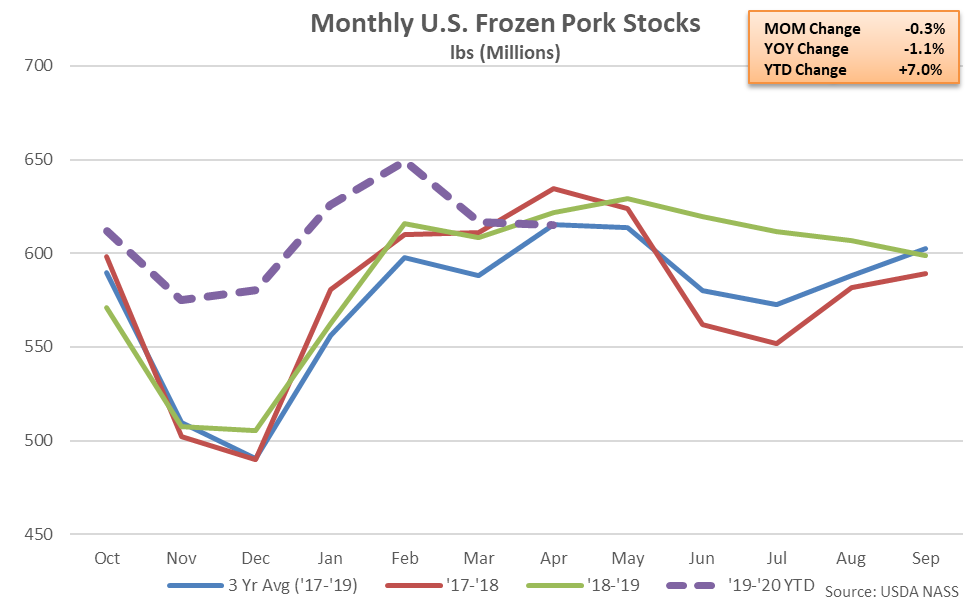 According to the USDA, Apr ’20 U.S. frozen pork stocks continued to decline from the four and a half year high level experienced throughout the month of February while finishing 1.1% lower on a YOY basis, reaching a three year low seasonal level. The YOY decline in pork stocks was the first experienced throughout the past 12 months. The MOM decline in pork stocks of 1.9 million pounds, or 0.3%, was a contraseasonal move when compared to the ten year average March – April seasonal increase in stocks of 19.0 million pounds, or 3.0%.
According to the USDA, Apr ’20 U.S. frozen pork stocks continued to decline from the four and a half year high level experienced throughout the month of February while finishing 1.1% lower on a YOY basis, reaching a three year low seasonal level. The YOY decline in pork stocks was the first experienced throughout the past 12 months. The MOM decline in pork stocks of 1.9 million pounds, or 0.3%, was a contraseasonal move when compared to the ten year average March – April seasonal increase in stocks of 19.0 million pounds, or 3.0%.
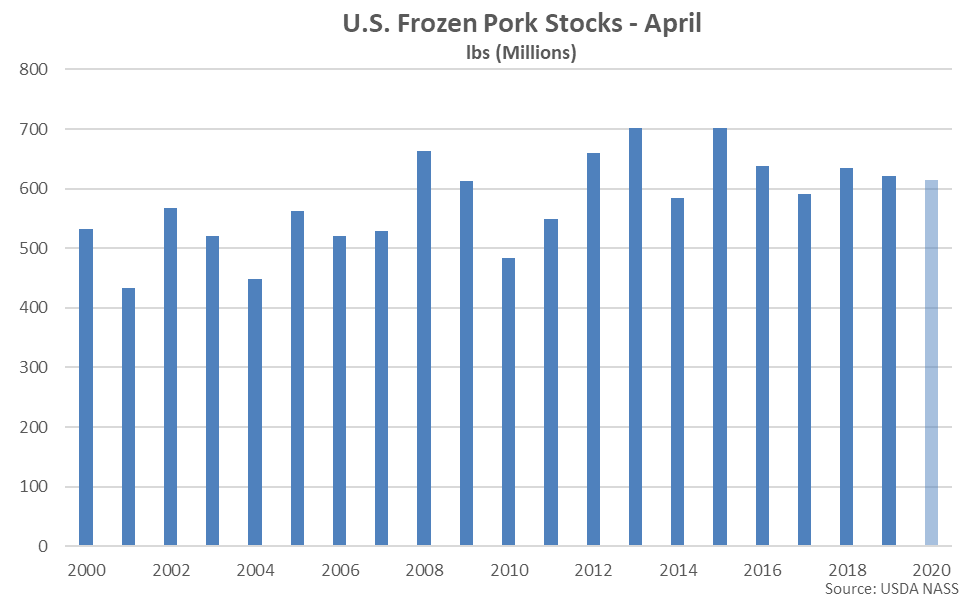 Beef – Stocks Remain at a Seven Year High Seasonal Level, Finish up 13.9% YOY
Beef – Stocks Remain at a Seven Year High Seasonal Level, Finish up 13.9% YOY
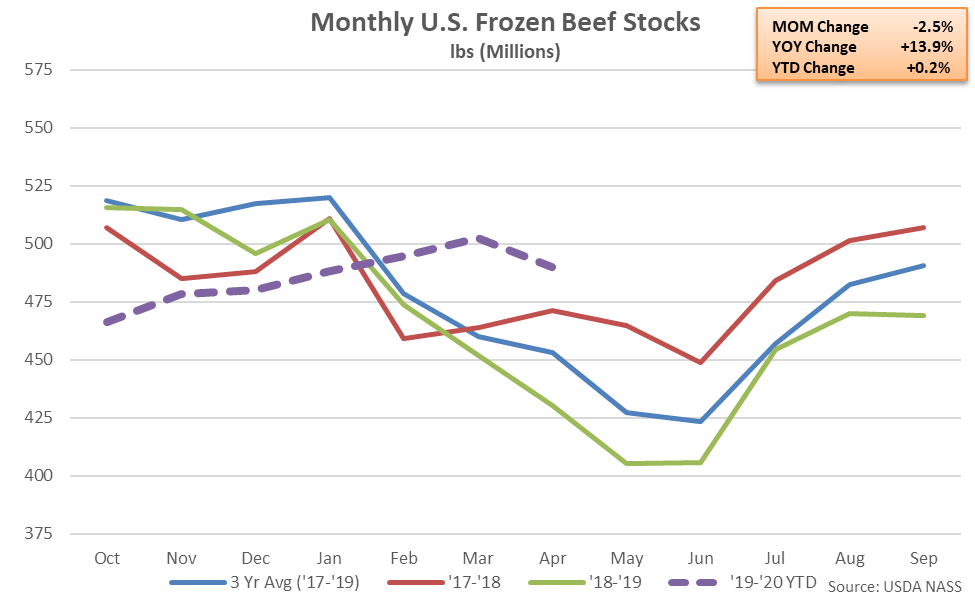 U.S. frozen beef stocks declined from the 14 month high level experienced throughout the previous month but remained 13.9% higher on a YOY basis during Apr ’20, reaching a seven year high seasonal level. The YOY increase in beef stocks was the third experienced in a row. Frozen beef stocks had finished lower on a YOY basis over 11 consecutive months prior to the three most recent YOY increases. The MOM decline in beef stocks of 12.3 million pounds, or 2.5%, was larger than the ten year average March – April seasonal decline in stocks of 3.9 million pounds, or 0.9%, however.
U.S. frozen beef stocks declined from the 14 month high level experienced throughout the previous month but remained 13.9% higher on a YOY basis during Apr ’20, reaching a seven year high seasonal level. The YOY increase in beef stocks was the third experienced in a row. Frozen beef stocks had finished lower on a YOY basis over 11 consecutive months prior to the three most recent YOY increases. The MOM decline in beef stocks of 12.3 million pounds, or 2.5%, was larger than the ten year average March – April seasonal decline in stocks of 3.9 million pounds, or 0.9%, however.
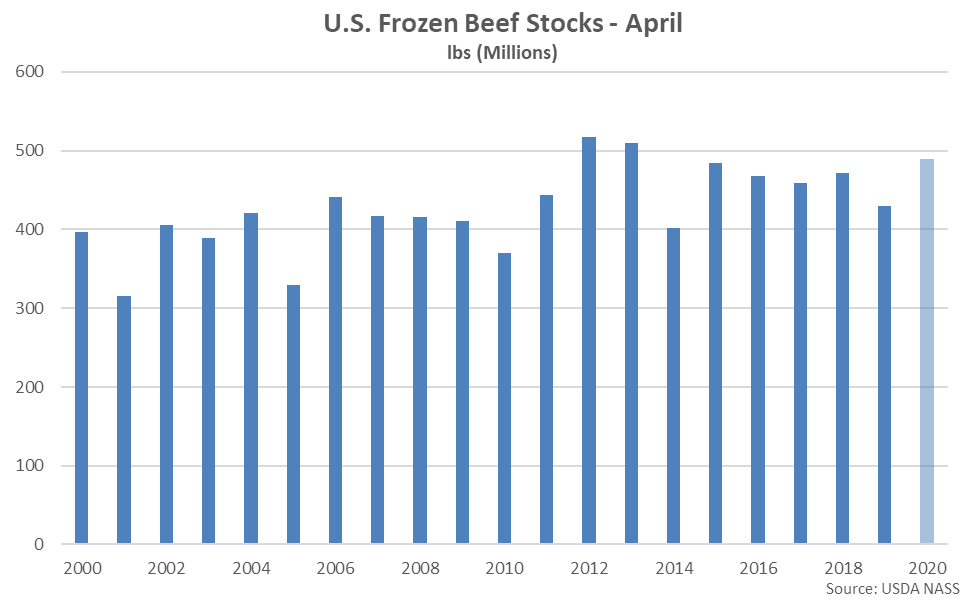 Chicken – Stocks Finish 6.0% Higher YOY, Remaining at a Record High Seasonal Level
Chicken – Stocks Finish 6.0% Higher YOY, Remaining at a Record High Seasonal Level
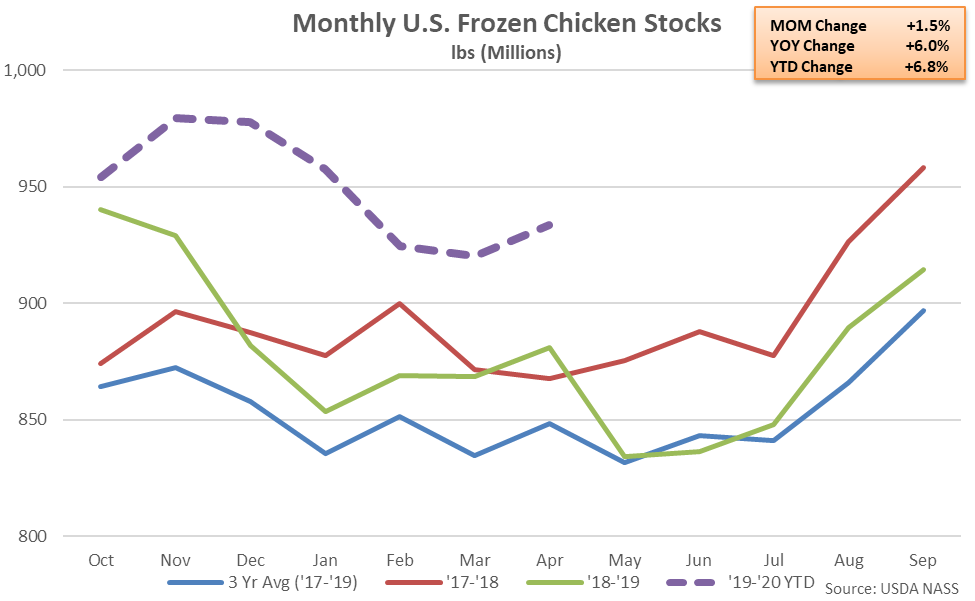 Apr ’20 U.S. frozen chicken stocks rebounded from the six month low level experienced throughout the previous month while remaining 6.0% higher on a YOY basis, finishing at a record high seasonal level. The YOY increase in chicken stocks was the seventh experienced in a row. The MOM increase in chicken stocks of 13.5 million pounds, or 1.5%, was smaller than the ten year average March – April seasonal decline in stocks of 20.2 million pounds, or 3.0%, however.
Apr ’20 U.S. frozen chicken stocks rebounded from the six month low level experienced throughout the previous month while remaining 6.0% higher on a YOY basis, finishing at a record high seasonal level. The YOY increase in chicken stocks was the seventh experienced in a row. The MOM increase in chicken stocks of 13.5 million pounds, or 1.5%, was smaller than the ten year average March – April seasonal decline in stocks of 20.2 million pounds, or 3.0%, however.
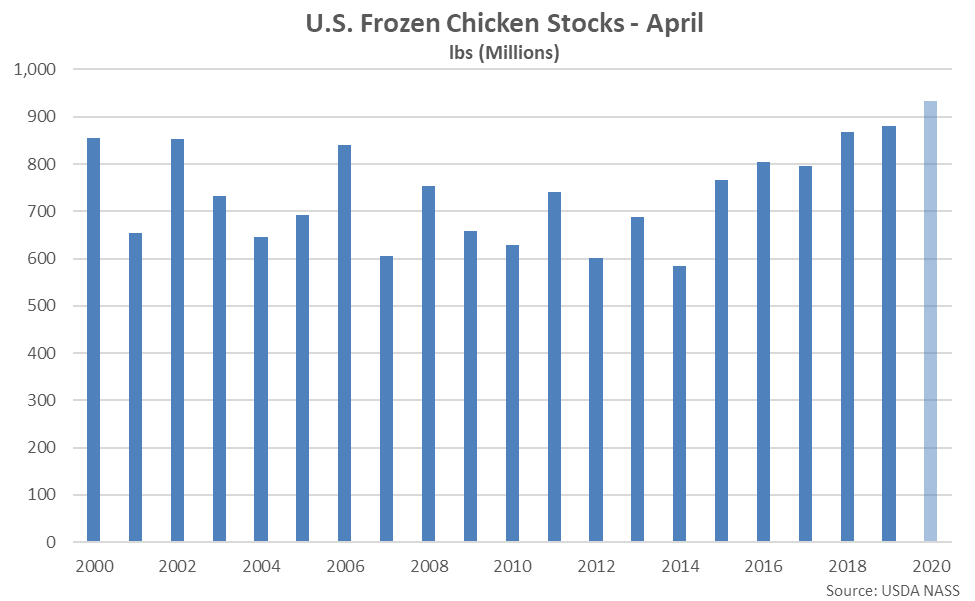 Overall, Apr ’20 combined U.S. pork, beef and chicken stocks finished 1.6% below the monthly record high level experienced throughout Jan ’20. Individually, Apr ’20 chicken stocks finished 4.7% below the record high storage level experienced throughout Nov ’19 while pork and beef stocks finished within 13% and 14% of historical maximum storage levels, respectively.
Overall, Apr ’20 combined U.S. pork, beef and chicken stocks finished 1.6% below the monthly record high level experienced throughout Jan ’20. Individually, Apr ’20 chicken stocks finished 4.7% below the record high storage level experienced throughout Nov ’19 while pork and beef stocks finished within 13% and 14% of historical maximum storage levels, respectively.
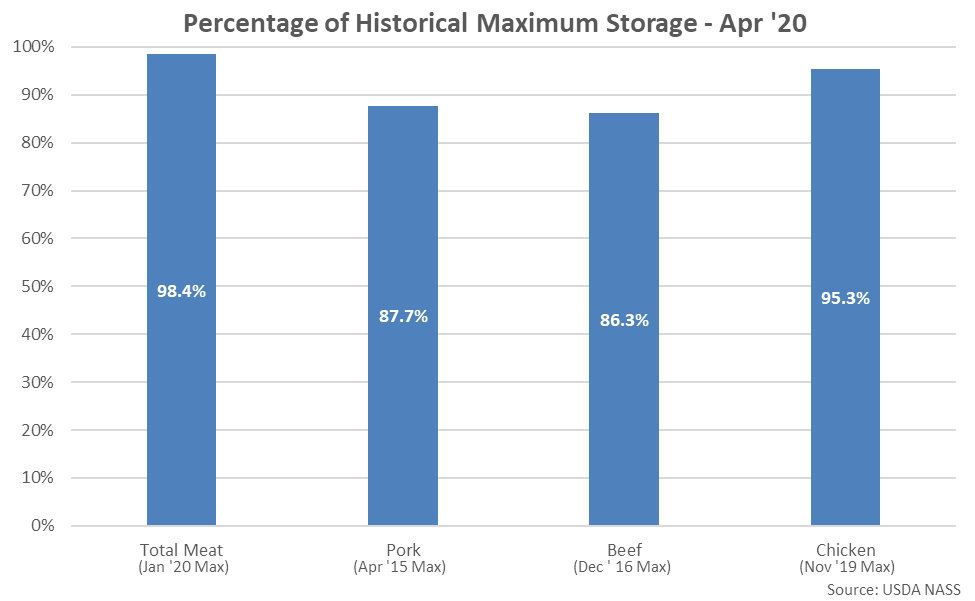 Apr ’20 combined U.S. pork, beef and chicken stocks finished at a record high seasonal level for the seventh consecutive month. Individually, Apr ’20 chicken stocks finished at a record high seasonal level while beef and pork stocks finished six percent and 13% below record high seasonal storage levels, respectively.
Apr ’20 combined U.S. pork, beef and chicken stocks finished at a record high seasonal level for the seventh consecutive month. Individually, Apr ’20 chicken stocks finished at a record high seasonal level while beef and pork stocks finished six percent and 13% below record high seasonal storage levels, respectively.
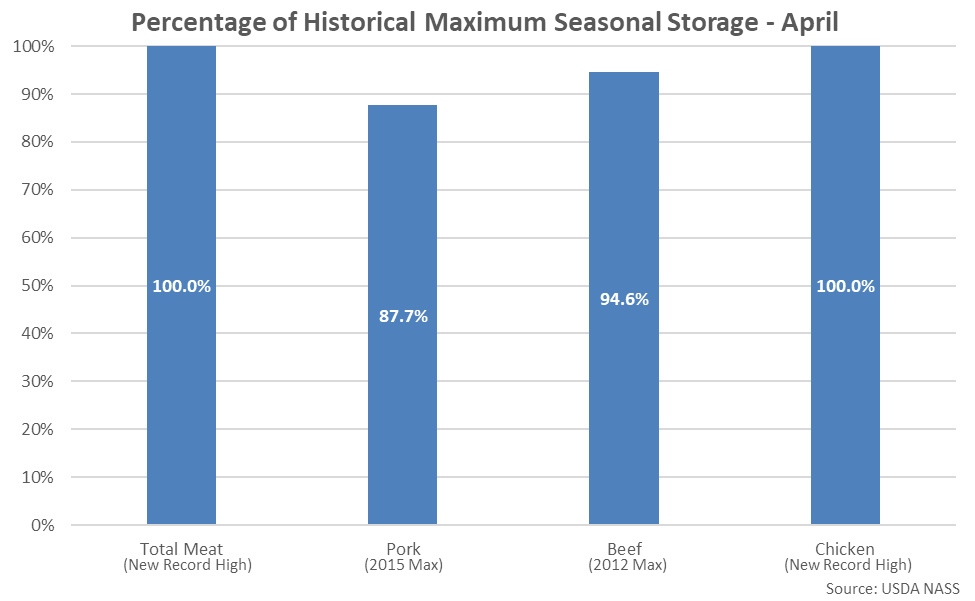 Apr ’20 combined U.S. pork, beef and chicken stocks finished 5.5% higher on a YOY basis. The Apr ’20 YOY increase in combined U.S. pork, beef and chicken stocks was the seventh experienced in a row but the smallest experienced throughout the past five months.
Apr ’20 combined U.S. pork, beef and chicken stocks finished 5.5% higher on a YOY basis. The Apr ’20 YOY increase in combined U.S. pork, beef and chicken stocks was the seventh experienced in a row but the smallest experienced throughout the past five months.
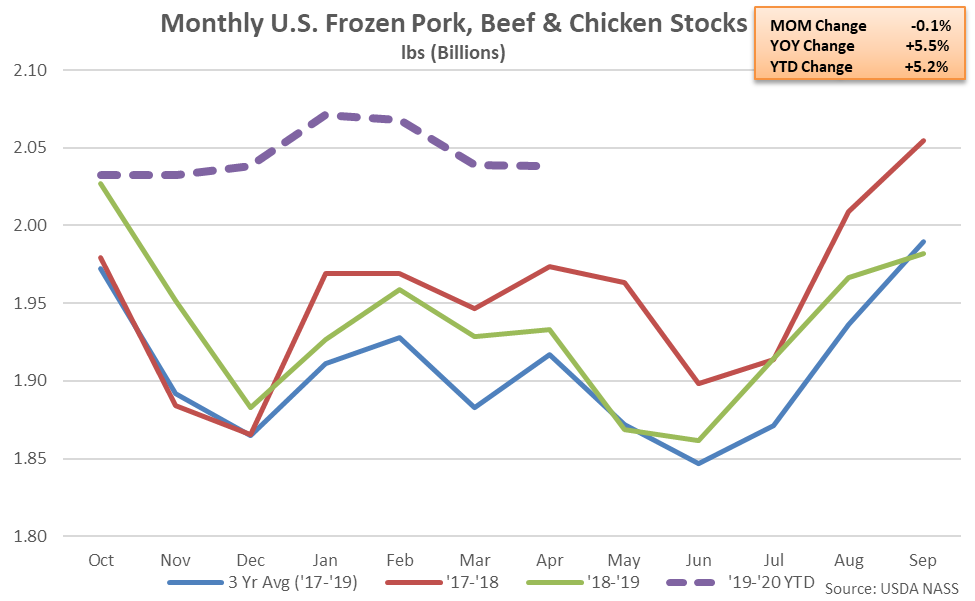
- U.S. pork stocks finished lower on a YOY basis for the first time in the past 12 months during Apr ’20, declining by 1.1% and reaching a three year low seasonal level.
- U.S. beef stocks remained higher on a YOY basis for the third consecutive month during Apr ‘20, finishing up 13.9% and reaching a seven year high seasonal level.
- U.S. chicken stocks finished 6.0% higher on a YOY basis during Apr ’20, remaining at a record high seasonal level.
 According to the USDA, Apr ’20 U.S. frozen pork stocks continued to decline from the four and a half year high level experienced throughout the month of February while finishing 1.1% lower on a YOY basis, reaching a three year low seasonal level. The YOY decline in pork stocks was the first experienced throughout the past 12 months. The MOM decline in pork stocks of 1.9 million pounds, or 0.3%, was a contraseasonal move when compared to the ten year average March – April seasonal increase in stocks of 19.0 million pounds, or 3.0%.
According to the USDA, Apr ’20 U.S. frozen pork stocks continued to decline from the four and a half year high level experienced throughout the month of February while finishing 1.1% lower on a YOY basis, reaching a three year low seasonal level. The YOY decline in pork stocks was the first experienced throughout the past 12 months. The MOM decline in pork stocks of 1.9 million pounds, or 0.3%, was a contraseasonal move when compared to the ten year average March – April seasonal increase in stocks of 19.0 million pounds, or 3.0%.
 Beef – Stocks Remain at a Seven Year High Seasonal Level, Finish up 13.9% YOY
Beef – Stocks Remain at a Seven Year High Seasonal Level, Finish up 13.9% YOY
 U.S. frozen beef stocks declined from the 14 month high level experienced throughout the previous month but remained 13.9% higher on a YOY basis during Apr ’20, reaching a seven year high seasonal level. The YOY increase in beef stocks was the third experienced in a row. Frozen beef stocks had finished lower on a YOY basis over 11 consecutive months prior to the three most recent YOY increases. The MOM decline in beef stocks of 12.3 million pounds, or 2.5%, was larger than the ten year average March – April seasonal decline in stocks of 3.9 million pounds, or 0.9%, however.
U.S. frozen beef stocks declined from the 14 month high level experienced throughout the previous month but remained 13.9% higher on a YOY basis during Apr ’20, reaching a seven year high seasonal level. The YOY increase in beef stocks was the third experienced in a row. Frozen beef stocks had finished lower on a YOY basis over 11 consecutive months prior to the three most recent YOY increases. The MOM decline in beef stocks of 12.3 million pounds, or 2.5%, was larger than the ten year average March – April seasonal decline in stocks of 3.9 million pounds, or 0.9%, however.
 Chicken – Stocks Finish 6.0% Higher YOY, Remaining at a Record High Seasonal Level
Chicken – Stocks Finish 6.0% Higher YOY, Remaining at a Record High Seasonal Level
 Apr ’20 U.S. frozen chicken stocks rebounded from the six month low level experienced throughout the previous month while remaining 6.0% higher on a YOY basis, finishing at a record high seasonal level. The YOY increase in chicken stocks was the seventh experienced in a row. The MOM increase in chicken stocks of 13.5 million pounds, or 1.5%, was smaller than the ten year average March – April seasonal decline in stocks of 20.2 million pounds, or 3.0%, however.
Apr ’20 U.S. frozen chicken stocks rebounded from the six month low level experienced throughout the previous month while remaining 6.0% higher on a YOY basis, finishing at a record high seasonal level. The YOY increase in chicken stocks was the seventh experienced in a row. The MOM increase in chicken stocks of 13.5 million pounds, or 1.5%, was smaller than the ten year average March – April seasonal decline in stocks of 20.2 million pounds, or 3.0%, however.
 Overall, Apr ’20 combined U.S. pork, beef and chicken stocks finished 1.6% below the monthly record high level experienced throughout Jan ’20. Individually, Apr ’20 chicken stocks finished 4.7% below the record high storage level experienced throughout Nov ’19 while pork and beef stocks finished within 13% and 14% of historical maximum storage levels, respectively.
Overall, Apr ’20 combined U.S. pork, beef and chicken stocks finished 1.6% below the monthly record high level experienced throughout Jan ’20. Individually, Apr ’20 chicken stocks finished 4.7% below the record high storage level experienced throughout Nov ’19 while pork and beef stocks finished within 13% and 14% of historical maximum storage levels, respectively.
 Apr ’20 combined U.S. pork, beef and chicken stocks finished at a record high seasonal level for the seventh consecutive month. Individually, Apr ’20 chicken stocks finished at a record high seasonal level while beef and pork stocks finished six percent and 13% below record high seasonal storage levels, respectively.
Apr ’20 combined U.S. pork, beef and chicken stocks finished at a record high seasonal level for the seventh consecutive month. Individually, Apr ’20 chicken stocks finished at a record high seasonal level while beef and pork stocks finished six percent and 13% below record high seasonal storage levels, respectively.
 Apr ’20 combined U.S. pork, beef and chicken stocks finished 5.5% higher on a YOY basis. The Apr ’20 YOY increase in combined U.S. pork, beef and chicken stocks was the seventh experienced in a row but the smallest experienced throughout the past five months.
Apr ’20 combined U.S. pork, beef and chicken stocks finished 5.5% higher on a YOY basis. The Apr ’20 YOY increase in combined U.S. pork, beef and chicken stocks was the seventh experienced in a row but the smallest experienced throughout the past five months.
